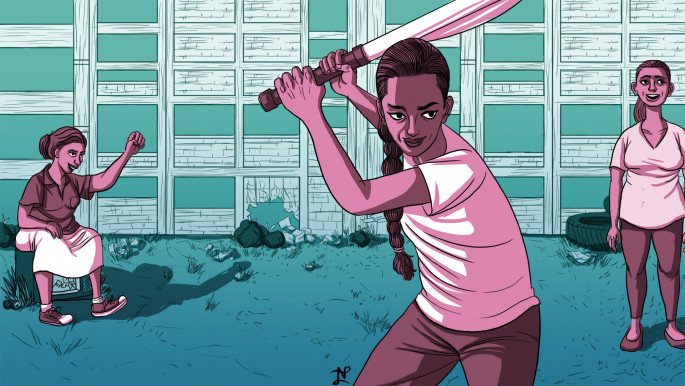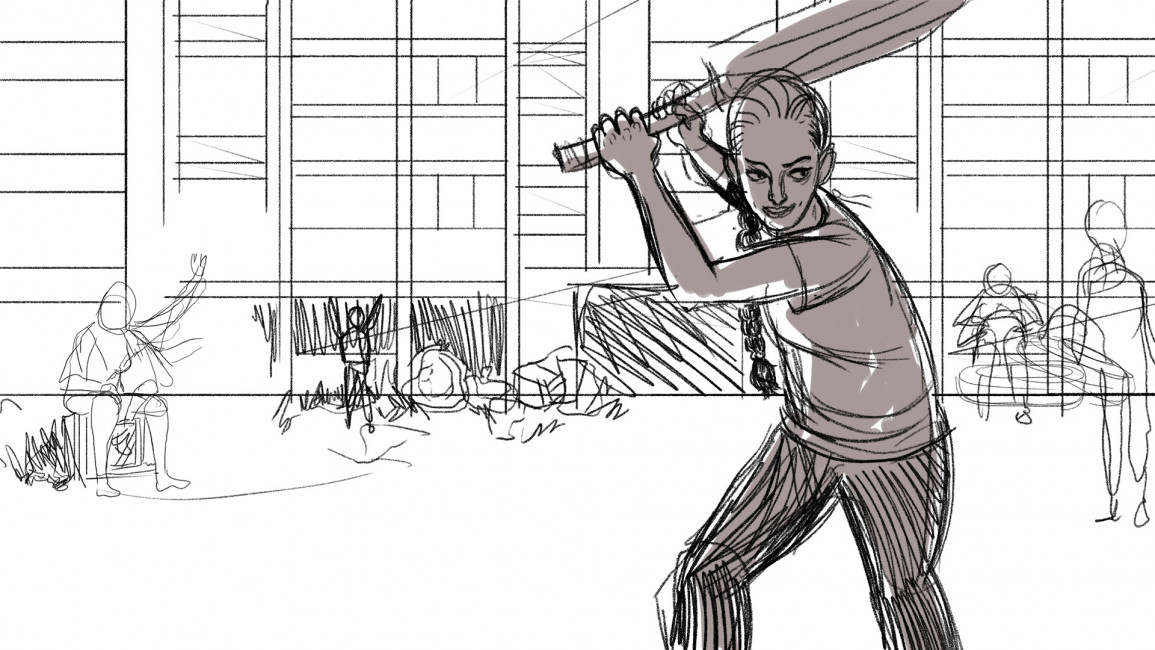
Cricket, advice and endless working days
I remember first meeting Prisha, a Sri Lankan domestic worker, on a sunny Sunday somewhere I had never been in Beirut.
She waited for me for half an hour outside a supermarket. I got lost. I didn’t mean to make her wait so long. She leads me up a hill. Garbage swallows our feet, sometimes reaches to our knees – a dump basically. The dump opens into a huge concrete field, strewn with more garbage and the concrete remains of torn-down buildings.
| How funny it is to be denied food, or a proper bed, or a phone-call to your mother or your children, to be made to work all day. |
This is where Prisha, friends and compatriots practice. Prisha is the captain of the women’s cricket team. Migrant workers from Sri Lanka and Pakistan all over Lebanon have created a network of cricket teams that meet and play every Sunday.
It’s an open space, an abandoned lot surrounded by abandoned factories, and everywhere people are playing cricket. Men stand by their motorcycles and mopeds and watch, some drinking beer. Women sit on the piles of rubble watching the game.
Prisha leads me to the other side of the ‘field’, where the women’s team practices. One broken cracked wall is adorned with colourful graffiti that reads ‘Beirut’. Though nothing here looks anything to do with Beirut. Beirut, or Lebanon, the single-coloured, often racist, self-obsessed place we live in, that for one day only, on Sundays, becomes colourful, international, full of flavour.
Anyway, back to the cricket. These Sri Lankans love the game. Mostly they started playing because their husbands play, so they would join them on Sundays. Then they got into it. They meet every Sunday and they play together. It’s their only day off. This is not only a cricket club. It’s a family.
Chana though, their top batswoman, has more important things she wants to talk to me about. My work permit has been cancelled, she says, because I have a baby daughter. Yes, I heard they are not renewing work permits for migrant workers with babies, I said. I don’t want to leave my husband, I have lived here for 15 years, I need to work, can you help me, she asks. I say I’ll see what I can do, but I really mean no. I just don’t have the heart to say it.
The sun is shining, a few fluffy clouds float by. Someone brings me a bottle of water, and I watch the cricket. All the women I speak to are seasoned domestic workers. Most have outgrown working for a single ‘Madame’ in a single household and are freelancers. They are in an illegal and precarious situation: as migrant domestic workers, by law they have to live and work in a single household under a single employer. ‘Freelancing’ puts them at risk of prison if they get caught. But it offers them a chance to make more money and have a family.
Not one of these women wants to tell me about their first two years in Lebanon. Not one of them wants to remember those days.
  |
|
| All illustrations by Anas Awad |
Advice
It’s a different Sunday now, and I am with Zeinab, an Ethiopian domestic worker who has also been in Beirut for 15 years. She is my age exactly. I meet her at a theatre workshop where she is part of a group of migrant domestic workers creating a play under the guidance of a well-known Lebanese theatre director. They turn their stories of misery with their ‘Madams’ into funny sketches.
How funny it is indeed to be denied food, or a proper bed, or a phone-call to your mother or your children, to be made to work all day, even at night, and to have your life totally taken over by the needs of strangers who do not care for you and for whom you do not care. Hilarious.
Zainab is no stranger to these miseries. Not only did she experience a lot of racism and trauma herself when she first moved to Beirut, she also holds court every Sunday in her employer’s home for other Ethiopian women to come and share their issues. Four young women are gathered there this Sunday, and Zainab tries to actively help when she can.
But mostly she gives advice, over a traditional Ethiopian lunch. At some point the conversation strays and becomes about Lebanese politics. Lebanon is very strange, they all agree, everyone hates each other and are always fighting - in Ethiopia it’s not like that, Christians and Muslims don’t kill each other, they live together.
Traditional coffee is served on a small piece of fake green grass, a sort of square piece of AstroTurf, on the floor. One of the women there is new to Beirut and domestic work – she has only been here 4 months. She left behind her daughter. She is one of 4 domestic workers in the house she ended up in. They are very rich, she tells me. It was her daughter’s birthday that day. She turned nine.
Happiness is a nine-year-old
Another nine-year-old lives on the other side of town. Her name is Happiness, and she is Nigerian. She sleeps on the sofa in the living room, which today is full of Nigerian women watching a Nigerian soap opera. They have a community meeting to plan the events of Nigerian Independence Day and are waiting for everyone to arrive. In the meantime, they cannot take their eyes off the screen.
I stand with Happiness in the entrance of the building, chatting. She is gentle and very smart. I can’t believe she is only nine. I ask her about school, and she tells me that its up in the mountains, it snows in the winter and it’s very cold when she waits for the bus in the morning, but she loves it. I realise she is referring to a school owned by the church, where they take in the children of migrant workers.
But I didn’t start school this year, she says. And why not? My residency papers weren’t renewed, so my father couldn’t enrol me, he has to take me back to Nigeria. Where will you live in Nigeria? My mother and brother are there, my mother left Lebanon when I was very small with my brother and I stayed with my father, I don’t remember them at all, but I have a picture of her. Can I see the picture? Yes, but my father is sleeping in that room and I cannot wake him to get it. I wonder what kind of life waits for her in Nigeria, and I am heartbroken.
The mentor
In a different part of town Pavi from Bangaldesh says that I can come over as soon as she finishes her meeting with the other Bangladeshi domestic workers, whom she is teaching about rights and responsibilities. As someone who has been in Lebanon for over a decade, she is a qualified mentor.
She invites me to her home, a small room near the elevator at the entrance of the building. We sit on her bed. The television is on top of the refrigerator; it is a very small room.
Pavi works so much, in so many different houses, that she has recruited a fellow Bangladeshi called Lucki to help her keep her own house in order. Lucki brings us a bowl of washed fruits. She slices an apple for me. Pavi has 3 parties to go to so she has to get ready while we talk. I have never seen a girl with so many boxes of makeup. Piles and piles of makeup, so many colours. So many bangles and earrings.
She takes a box of red powder and with her thumb, she makes a vertical line of red on her forehead, going into her hair. This is a sign that she is married, she explains. While she is getting ready she gives me an old shoebox of photographs to look at. This is my daughter, she says, I work to support her but she hates me because I am never there, and she spends all the money I send her on candy and chocolates. When she is done, she says we can go now. She doesn’t feel like tidying up – Lucki will do it.
I remember Pavi insisting that I join her for the party, but I decide to go home. I remember thinking of how easy it is to pity and victimise those who we think are less fortunate than us.
Editor's note: All names have been changed to protect identities.





 Follow the Middle East's top stories in English at The New Arab on Google News
Follow the Middle East's top stories in English at The New Arab on Google News


